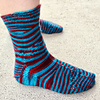patterns >  Carolyn Lisle Designs and 1 more...
Carolyn Lisle Designs and 1 more...
> Tana Socks
Tana Socks
The Tana Socks are inspired by Furcifer lateralis, the Carpet Chameleon, a species of chameleon from Madagascar. “Tana” is the word for “chameleon” in the local Malagasy language. Like all chameleons, they are famous for their ability to change colour in intense patterns, and in general, chameleons are very unusual-looking creatures. These socks were designed to honour that fine line between bizarre and beautiful by encouraging a multicoloured yarn to pool in as many different ways as possible in a single sock.
Pattern Description
These socks use both slipped stitches and short rows to really make a variegated yarn shine as the pooling patterns shift throughout the socks. They feature a gusset and heel flap short-row heel and a garter rib cuff for additional visual interest. Elongating the stitches to be slipped helps keep the socks stretchy and comfortable and provides more variation in the colour patterning.
These socks are knit toe-up. This pattern requires the knitter to be able to knit a small circumference in the round (either on double-pointed needles or your preferred technique for socks) and clearly explains all techniques for increases, decreases, German short rows, and elongated stitches. Within the pattern you will find links to useful video tutorials as well, so the pattern is accessible to an intermediate sock knitter.
Yarn Requirements and Sizing
These socks are available in three adult foot circumferences: 18 (20.5, 23) cm / 7 (8, 9) inches — 56 (64, 72) st — and are adjustable in length and height. They require approximately 275 (300, 325) m / 300 (325, 350) yards of fingering or light fingering weight yarn for average foot lengths.
Variegated yarns with regular repeating colour sequences and self-striping yarns with very narrow, irregular-width stripes offer the best results for this pattern.
These socks are rated 5/5 — Challenging — on my sock pattern difficulty scale. This is because they have extensive short-row shaping in the construction, texture worked on both sides of the fabric, and wide charts.
Note that there are two files included with this pattern; one contains chart-based instructions and the other is fully written with no charts. Both produce the same final product.
21338 projects
stashed
20068 times
5446 projects
stashed
5403 times
3113 projects
stashed
4712 times
1770 projects
stashed
2500 times
258 projects
stashed
479 times
- First published: January 2020
- Page created: January 23, 2020
- Last updated: January 31, 2025 …
- visits in the last 24 hours
- visitors right now











